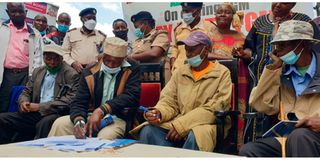Kuria FGM victims to testify against parents in court

Kuria elders sign a memorandum to end female genital mutilation in Kehancha town on October 8, 2021, after a consultative meeting with officials from the Anti-FGM Board.
What you need to know:
- Chiefs also warned against tolerating vice.
- Twenty-two counties considered hotspots.
The government has cracked down on parents who perpetuate female genital mutilation (FGM) in Kuria, Migori County.
Many girls underwent the cut during the December holidays.
Mabera sub-county children’s officer Janet Robi on Wednesday said 57 parents were on remand after they were charged with abetting FGM. The parents were granted a Sh500,000 bond each. They are held in Migori GK Prison after they failed to secure their release.
Some 18 parents were arrested in Tagare ward, and another 21 in Kososoko/Nyamosense ward. Another hotspot is Sasaba ward.
Robi added that 94 children, all of whom have been cut, are lined up to testify in court against their parents. Sixteen girls were released as their parents were missing. Twenty-three of them were committed to charitable institutions and were presented in court on Friday, while another 21 will testify on April 29, 2022.
Porous border
Due to the porous border with Tanzania, some victims and perpetrators are believed to be hiding in the neighbouring country.
During a meeting called to review the progress of the ongoing campaign, dubbed StopKuriaFGMNow, it emerged that more than 500 girls have been cut since December 13 last year.
Cecilia Wangui from Zinduka Organisation said the numbers could be higher owing to cross-border FGM and the fear to report. She said lack of adequate resources have impeded the fight against the vice.
Mr Vincent Ogallo said FGM was already underway before schools closed for the December holidays.
“Our swift action helped to rescue many girls who were at risk of undergoing the cut and ensured they were safe in temporary rescue centres,” said Mr Ogallo.
He applauded local administrators for working hand in hand with anti-FGM crusaders and gender activists to fight the menace.
Chiefs partly blamed
However, Gregory Rioba took issue with some chiefs for being FGM sympathisers.
“Some of the area chiefs failed us. Even after reporting to them on cases of FGM that were happening in their jurisdiction, no action was taken to prevent it from happening. Action also needs to be taken against such administrators,” said Mr Rioba.
He said some of the known cutters being protected in the area are relatives of some of the chiefs.
Not all chiefs, however, abet the vice. Early this month, police arrested the wife of a chief for allegedly abetting FGM. Kuria West sub-county police commander Cleti Kimaiyo said the woman, 30, was arrested after her husband reported the matter to the police. The girl was also found during the night arrest.
Mr Kimaiyo said the suspect took the daughter for the cut without the knowledge of the chief. To ensure no more girls are cut in April when schools close, anti-FGM crusaders plan to undertake a robust campaign to sensitise locals to the dangers of FGM.
Kenya banned the practice in 2011, paving the way for the Female Genital Mutilation Act, 2011, which carries a minimum punishment of three-year imprisonment and a Sh200,000 fine.
Some of the parents in Kuria who pleaded guilty to abetting FGM two weeks ago were slapped with a six-year jail term.
According to Unicef, about four million girls and women in Kenya have undergone FGM. Overall, 21 per cent of girls and women aged 15 to 49 have been subjected to the practice.
Twenty-two counties in the country are considered FGM hotspots. They include Samburu, Kisii, Nyamira, Narok, Kajiado, West-Pokot, Elgeyo-Marakwet, Baringo, Isiolo, Tana River, Tharaka-Nithi, Taita Taveta, Kwale, Wajir, Mandera and Garissa.





